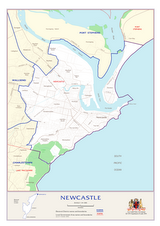Poor planning ignores people
Why are local communities being alienated from the planning process?
Planning for the future of our towns and cities is not rocket science.
There are a few simple principles that apply...
1. Protect the natural areas - and modern science now knows that islands of nature reserves don't work, they must be connected across the landscape for the species to survive (especially with climate change!).
2. Discuss with the community what "built heritage" should be protected - places of cultural significance including indigenous and historic places with cultural values.
3. Increase densities in city centres and around transport hubs (read railway stations) and stop sprawl (the draft Lower Hunter Regional Strategy talked about "inter urban breaks" to constrain urban sprawl and try to meet principle 1 above)
4. Provide diverse employment opportunities within easy access of residential centres - mix it up, don't create a mega "employment park" at woop woop and hope that'll do the trick. Provide a mix of land uses to create a variety of housing choices and opportunities.
5. Provide parks and open space areas within the urban areas - the parks need to be diverse: "pocket" parks (single lot), small parks, large fields (cricket/football oval) and bush parks are all needed - especially as population densities increase (Hong Kong has 40% of its area in National Parks!)
6. Ensure there are design criteria in place so you don't end up with concrete boxes for houses! Ensure safety is incorporated into the urban form by mixing uses with different day/night usage patterns and by ensuring that all areas have passive surveillance.
7. Urban development should be carefully integrated with transport needs of residents, focusing on providing to future residents high quality public transport, cycling and pedestrian options.
8. Design the buildings to reduce energy use (eg maximise the use of natural light, heating and ventilation and ensure the building is well insulated), reduce water consumption (eg water efficient appliances and install rainwater tanks at the construction stage), use materials that are renewable, easily recycled or reused, design the building to be adaptable (allows for modification in the future (eg when owners get old) without excessive reconstruction); design in the onsite provision of waste and recycling separation and composting/worm farms.
And while we can think of many examples where these simple principles are not applied (or are flagrantly ignored), this is not the reason why people feel alienated from the planning process.
It's that "other" key principle of good land use planning...
9. Involve the community! Let the local communities make the decisions, guided by good over-arching policies and principles. Setup a development process that is open and transparent, where decisions are predictable, everyone can read the rules and "knows the ball game".
So should Newcastle have a 40-storey tower???
Let's have the conversation, guided by good policies and principles (not by Sydney backroom deals with select wealthy developers).




